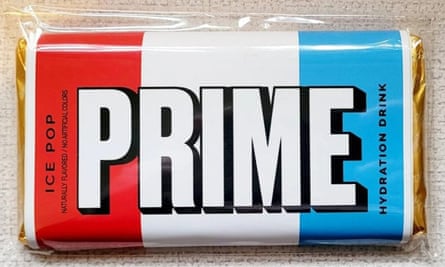Consumers have been warned not to buy or eat fake branded Wonka or Prime chocolate bars over fears they could be unsafe.
The Food Standards Agency said it had received reports of the bars being on sale, and was working with Trading Standards to protect consumers.
The safety watchdog said there was a possibility that the chocolate bars were being made or repackaged by unregistered businesses or by criminals who had not followed hygiene, labelling and traceability laws.
The Prime bars carry the logo of the popular energy drink but its makers say they do not make any branded food, so shoppers can assume they are all fake.
With the Wonka film due out at the weekend, sellers of the chocolate may be hoping to cash in, but consumers have been advised that the bars on sale will not be the real thing.
 View image in fullscreenA photo issued by the Food Standards Agency of a fake Prime-branded chocolate bar. Photograph: Food Standards Agency/PA
View image in fullscreenA photo issued by the Food Standards Agency of a fake Prime-branded chocolate bar. Photograph: Food Standards Agency/PA
As well as concerns over the manufacturing of the items, the FSA said consumers could also be in danger as a result of mislabelling. Counterfeit Wonka Bars removed from sale last year were found to contain allergens that were not listed on the packaging, posing a big health risk to some consumers.
In August, a sweetshop owner was fined £7,200, plus court costs, after he was found to be selling Wonka bars without permission to use the name and using wrappers that did not give allergen information about milk and soya in the correct format.
Recently, police launched an investigation after chocolate sold on a market stall in Mansfield made people ill. Hallucinogenic drugs were found in the bars, which were branded Cali-Gold.
Tina Potter, the head of incidents at the FSA, said: “With Christmas coming up, don’t waste your money on fake branded chocolate for your children, friends or family – you won’t be getting what you think you are paying for and you don’t know what is in them.
skip past newsletter promotion
Sign up to Business Today
Free daily newsletter
Get set for the working day – we’ll point you to all the business news and analysis you need every morning
Enter your email address Enter your email address Sign upPrivacy Notice: Newsletters may contain info about charities, online ads, and content funded by outside parties. For more information see our Privacy Policy. We use Google reCaptcha to protect our website and the Google Privacy Policy and Terms of Service apply.
after newsletter promotion
“There could be a food safety risk, especially for those with food intolerances or allergies.”
Potter added that shoppers who believed they had seen fake goods should inform their local authority.



